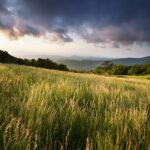“…A realm and not merely a trail marks the full aim of our efforts.”
Benton MacKaye, the Appalachian Trail’s visionary
The Appalachian Trail Landscape
Recognized as a globally significant region, the Appalachian Trail Landscape contains a wide variety of species and critical natural resources, including a vast canopy of resilient forests and a network of streams and rivers. This natural network provides more than 119 million people with critical resources like clean water. More than 38 million people make up the diverse communities and cultures across this urbanized and populous Landscape. No natural region in the U.S. is as integrated into the economies and livelihoods of communities as this region.

Steven Yocom
The Appalachian Trail Landscape has long served as an important wilderness recreation resource, a refuge from development that preserves ecological diversity, and a primary north-south migration corridor for native wildlife in the region. With elevations ranging from 124 feet to over 6,500 feet above sea level, the trail sits upon one of the world’s most topographically and biologically diverse landscapes. The Appalachian landscape also provides critical climate change refugia for the future adaptation needs of plants and animals. Experts agree that the Appalachian Trail Landscape must be conserved and connected to maintain its resilience and biodiversity while protecting species’ current and future opportunities to move across eastern North America.
The Wild East Action Fund
This funding program provides grants to qualified organizations working to conserve and connect the wild, scenic, and cultural wonders of the Appalachian Trail and its landscape, also known as the Wild East.
Wild East Action Fund
Ember Photography courtesy of Trust for Public Land
The Appalachian Trail Landscape Partnership
The Appalachian Trail Conservancy and the National Park Service co-convene the Appalachian Trail Landscape Partnership, or ATLP, which includes top conservationists who are committed to a bold vision of greater A.T. conservation in the face of 21st-century threats. The mission of the ATLP is to connect the wild, scenic and cultural wonders of the Appalachian Trail and its surrounding landscape. All entities working on land conservation along and aside the Appalachian Trail are invited to participate in ATLP efforts.
Learn More about ATLP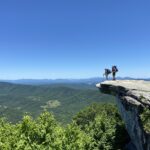
McAfee Knob, Jean Ann Bussell
A.T. Community™ Program
There are 56 communities along the Appalachian Trail’s corridor that have been recognized in the A.T. Community™ program. These towns and cities are assets for everyone who uses the A.T., providing food, supplies, recreation, history, volunteer opportunities and so much more. Find special events and promotions, plan your own A.T. adventures — whether for an afternoon or for multiple days — and explore everything these communities have to offer.
A.T. Communities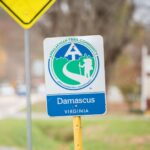
Building an Enduring Appalachian Climate Corridor
In 2021 and 2022, the Appalachian Trail Conservancy, the Center for Large Landscape Conservation, members of the Appalachian Trail Landscape Partnership, and dozens of other climate and conservation experts convened to explore ways to enhance the climate resiliency of the A.T. landscape. Their recommendations are included in a comprehensive report
Appalachian Climate Corridor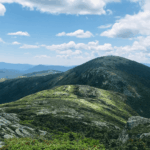
Collaborative Partnerships
We have an obligation to protect high-value scenic views and connectivity for the greater A.T. landscape, advance habitat preservation for threatened natural areas, and ensure the Trail experience endures for generations to come. By collaborating with external partners, the ATC is actively addressing potential impacts from permitted projects near the Appalachian Trail, including the Mountain Valley Pipeline.
Collaborative Partnerships
The Appalachian Trail Community Conservation Collaborative
The Appalachian Trail Community Conservation Collaborative is an exciting initiative led by the ATC dedicated to amplifying local voices and supporting community-led conservation in Pennsylvania. The Collaborative is open to towns, small cities, townships, and boroughs across the Pennsylvania Appalachian Trail Landscape.
About the Collaborative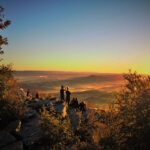
Regional Conservation Partnerships

South Mountain Partnership
The South Mountain Partnership is a regional, landscape-scale conservation project in south-central Pennsylvania. This Partnership emerged in 2006 to guide efforts within the South Mountain Conservation Landscape, one of seven Conservation Landscapes that the Pennsylvania Department of Conservation and Natural Resources (DCNR) has identified throughout the state.
View Website
Heart of Maryland Conservation Alliance
The Heart of Maryland Conservation Alliance has emerged to conserve the region’s history, forests, farmland, mountains, streams and quality of life in the face of escalating development pressure. The Catoctin and South Mountain ridges of the Blue Ridge Mountains in central Maryland form an evocative landscape that includes the Appalachian Trail landscape corridor.
View Website
Northern Appalachian Trail Landscape Partnership
Formed in early 2017, the Northern A.T. Landscape Partnership works to catalyze landscape conservation from New York to Maine and has the goal of protecting 1.4 million acres within the HUC-10 watershed boundary. Of those 1.4 million acres, 131,000 are within 1 mile of the Appalachian Trail.
View Website
Blue Ridge Alliance
Blue Ridge Conservation Alliance collaborates to conserve land, safeguard watersheds, and preserve the historic landscape along the Appalachian Trail corridor and the Potomac and Shenandoah rivers.
View Website
New York Highlands Network
The New York Highlands Network supports the vital work of protecting wildlife across the New York Highlands region. By bringing together conservation organizations, neighbors, and landowners, and creating green corridors, the Network amplifies successes in this race against time.
View Website
Kittatinny Coalition
The Kittatinny Coalition, co-led by Audubon PA and the ATC, is an alliance of organizations, agencies and academic institutions working together to conserve the natural, scenic, cultural, and aesthetic resources of the Kittatinny Ridge and Corridor.
View Website
